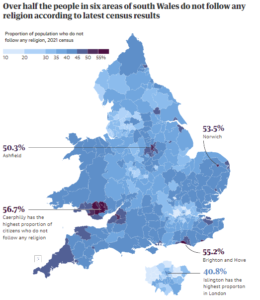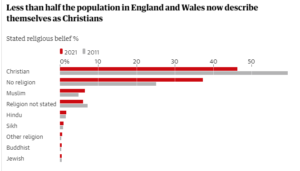According to the 2021 census, which also reveals that Leicester and Birmingham have become the first UK cities to have “minority majorities,” England and Wales are now minority Christian countries.
The census showed a 5.5 million (17%) decrease in the number of people who identify as Christians and an increase of 1.2 million (43%) in the number of persons who identify as Muslims, bringing the total number of Muslims to 3.9 million. The number of Christians has decreased by 13.1 in percentage points, while the number of Muslims has increased by 1.7. Less than 50% of the population identified as Christians for the first time in an England and Wales census.
The second most frequent option, behind Christianity, was “no religion,” which was given by 37.2% of respondents, or 22.2 million people. This indicates a growth of more than 22 percentage points in the past 20 years in the percentage of persons who claim to have no religion from its previous level of 14.8%. The census result “throws down a challenge to us not merely to trust that God will build his kingdom on Earth but also to perform our part in making Christ known,” according to York’s archbishop, Stephen Cottrell. “We have passed the time when many people virtually immediately identified as Christians, but other studies repeatedly reveal how the same individuals still seek spiritual truth, knowledge, and a system of principles to live by,” he continued.

“One of the most startling things about these census figures is how at odds the population is from the state itself,” said Andrew Copson, chief executive of Humanists UK. We have the most non-religious populace of any state in Europe, but we also have the most religious setup in terms of legislation and public policy. The Guardian’s analysis reveals that locations with a higher percentage of residents from ethnic minorities also tend to be more religious. Additionally, areas with a higher percentage of white residents also have a higher percentage of atheists. Caerphilly, Blaenau Gwent, and Rhondda Cynon Taf in south Wales, as well as Brighton and Hove and Norwich in England, were the locations with the largest percentages of residents who claimed they did not practice any religion.
They were among 11 places, the majority of which had relatively small ethnic minority populations, where more than half the population did not identify as religious. These places included Ashfield in Nottinghamshire, Hastings in East Sussex, and Bristol. Harrow, Redbridge, and Slough, where nearly two-thirds of the population comes from a minority ethnic background, had the lowest percentage of atheists. The ethnicity, religion, and language information of about 60 million people were obtained in a snapshot census on March 21, 2021, and it reveals the decline in religion and the development of minority ethnic populations as a combined majority in full conurbations in England and Wales. Different trends of aging, fertility, death, and migration were highlighted by the Office for National Statistics (ONS) as potential causes for the shift in the religious makeup of the nations.

In the two nations, 81.7% of the people are now white, including non-British, down from 86% in 2011, 9.3% are Asian Britons, up from 7.5%, 2.5% are Black, Black British, Black Welsh, Caribbean-African, and African, up from 1.8%, and 1.6% are other races. The ONS data revealed that 59.1% of Leicester citizens are now from ethnic minority groups, ushering in a new era of city-wide “super-diversity.” This represents a significant shift from 1991 when little over a quarter of the city’s population was black and minority ethnic. After 20,000 individuals relocated to Leicester after being expelled from Uganda in 1972, the Asian community in the east Midlands manufacturing city initially established itself.


